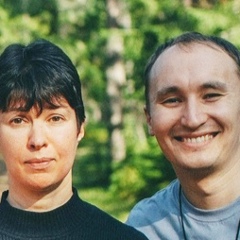Попыталась познать дзен, но пока не могу, потому что бесявость не отпускает.
Например, меня страшно бесят голословные заявления. Ну то есть не те, где "а у нас вот так", а те где людей обобщают в категорию и делают вывод, основанный лишь на мнении. Это абсолютно антинаучно и тем более возмутительно, когда человек кагбэ с профильным образованием этим грешит.
Например, вот недавно читала в статье психолога, что, дескать, отселять ребёнка в другую кровать надо не позднее 1.5 лет, а в другую комнату - не позднее трёх лет (владельцы однокомнатных квартир на этом моменте, очевидно, должны просто самоуничтожиться). С какого потолка вообще взяты эти цифры и выводы совершенно непонятно, но я не стала возникать сразу, а сперва перечитала одного из главных исследователей совместного сна с ребёнком и его аспектов, посвятившего этому всю свою жизнь - Джеймса МакКенна (профессор, заведующий кафедрой антропологии университета Нотр-Дамм, США), а также книги Карлоса Гонсалеса (педиатр, основатель Каталонской ассоциации поддержки грудного вскармливания). Первый написал о совместном сне целую книгу и провел обзор исследований его института, второй - провёл общий обзор имеющейся научной литературы. В том числе касательно психологического аспекта. Что было несложно, потому что реальных исследований влияния совместного сна на психику ребёнка всего два: Okami P., Weisner T., Olmstead R., Outcome correlates of parent-child bedsharing: an eighteen-year longitudinal study (J. Dev. Behav. Pediatr. 2002) и Forbes J. F., Weiss D. S. and Folen R. A. The cosleeping habits of military children. (Mil. Med. 1992).
Это реально два единственных пролонгированных исследования, когда смотрят на влияние совместного сна на психику, становление личности ребёнка, а потом и взрослого. Выводы: у спавших совместно более стабильная психика, меньшая склонность к неврозам, большая устойчивость к стрессу (на самом деле так говорить не грамотно, но воспользуемся устоявшимся выражением). Это в детстве. Во взрослом возрасте особенной разницы не выявлено.
При этом, эти исследования тоже не идеальны, поскольку почти невозможно сделать корректную группу испытуемых, сравнимую с контрольной группой: на место сна ребёнка влияют такие факторы, как геолокация, национальность, социальное положение, обеспеченность, не говоря уже о характере и темпераменте самих родителей. То есть сложно делать выводы о причине формирования той или иной психологической особенности, поскольку причин может быть масса, а исследование узкое весьма.
По этой же причине не проводилось (и вряд ли будет) исследование детской восприимчивости во сне. Психолог из той же статьи писал, что ребёнок улавливает любые шумы, даже во сне, и, дескать, поэтому шум от звуков близости родителей даже во сне нанесёт ему травму. Но для проверки этого заявления нужно выбрать примерно равную социально, материально и национально, группу из, как минимум, 100 детей и их родителей, готовую на пролонгированный эксперимент, контрольную группу (аналогичную и в аналогичном количестве), всем детям каждую ночь крепить датчики и делать полноценную сонограмму, в то время как родители из одной группы занимаются сами понимаете чем, а из другой - нет. Ну и по стадиям сна и активности зон мозга делать выводы о восприимчивости и влиянии. (Вы уже начинаете понимать почему такой эксперимент маловозможен, да ведь?????) Маловозможен, но он был бы единственным показательным.
И после него сомнительные авторы не писали бы масштабных выводов, основанных исключительно на их опыте. Это, конечно, плюс.
Такие дела.
П.С. Может показаться, что мне лишь бы поспорить, но это совсем не так. Я терпеть не могу спорить и оспаривать, но я за добра и бобра. А когда я встречаю странную неверифицируемую информацию, я понимаю, что находятся люди, которые её не только встречают, но верят и пользуются, не надо так.
П.С. 2 Зато прочитанное навело меня на целый пласт размышлений на тему секса и табу. Потому что весь детско-подростковый период человек в нашей замечательной стране живёт во власти табу и "заборов", где все страшно и нельзя даже разговаривать об этом. Зато потом он тратит охрененное количество времени на то, чтобы эти заборы в себе сносить. А все от отсутствия нормального сексуального воспитания, конечно. Родители с детьми не могут нормально говорить на эту тему и боятся это делать, поэтому информация приходит извне и в весьма деформированном виде, что, умноженное на её табуированность, порождает просто миллиард монстров и соответствующее отношение у ребёнка и подростка. Но это отдельная тема, на неё почти бесконечно разговаривать можно, так что, пожалуй, пока заткнусь.:)
У меня всё.
Например, меня страшно бесят голословные заявления. Ну то есть не те, где "а у нас вот так", а те где людей обобщают в категорию и делают вывод, основанный лишь на мнении. Это абсолютно антинаучно и тем более возмутительно, когда человек кагбэ с профильным образованием этим грешит.
Например, вот недавно читала в статье психолога, что, дескать, отселять ребёнка в другую кровать надо не позднее 1.5 лет, а в другую комнату - не позднее трёх лет (владельцы однокомнатных квартир на этом моменте, очевидно, должны просто самоуничтожиться). С какого потолка вообще взяты эти цифры и выводы совершенно непонятно, но я не стала возникать сразу, а сперва перечитала одного из главных исследователей совместного сна с ребёнком и его аспектов, посвятившего этому всю свою жизнь - Джеймса МакКенна (профессор, заведующий кафедрой антропологии университета Нотр-Дамм, США), а также книги Карлоса Гонсалеса (педиатр, основатель Каталонской ассоциации поддержки грудного вскармливания). Первый написал о совместном сне целую книгу и провел обзор исследований его института, второй - провёл общий обзор имеющейся научной литературы. В том числе касательно психологического аспекта. Что было несложно, потому что реальных исследований влияния совместного сна на психику ребёнка всего два: Okami P., Weisner T., Olmstead R., Outcome correlates of parent-child bedsharing: an eighteen-year longitudinal study (J. Dev. Behav. Pediatr. 2002) и Forbes J. F., Weiss D. S. and Folen R. A. The cosleeping habits of military children. (Mil. Med. 1992).
Это реально два единственных пролонгированных исследования, когда смотрят на влияние совместного сна на психику, становление личности ребёнка, а потом и взрослого. Выводы: у спавших совместно более стабильная психика, меньшая склонность к неврозам, большая устойчивость к стрессу (на самом деле так говорить не грамотно, но воспользуемся устоявшимся выражением). Это в детстве. Во взрослом возрасте особенной разницы не выявлено.
При этом, эти исследования тоже не идеальны, поскольку почти невозможно сделать корректную группу испытуемых, сравнимую с контрольной группой: на место сна ребёнка влияют такие факторы, как геолокация, национальность, социальное положение, обеспеченность, не говоря уже о характере и темпераменте самих родителей. То есть сложно делать выводы о причине формирования той или иной психологической особенности, поскольку причин может быть масса, а исследование узкое весьма.
По этой же причине не проводилось (и вряд ли будет) исследование детской восприимчивости во сне. Психолог из той же статьи писал, что ребёнок улавливает любые шумы, даже во сне, и, дескать, поэтому шум от звуков близости родителей даже во сне нанесёт ему травму. Но для проверки этого заявления нужно выбрать примерно равную социально, материально и национально, группу из, как минимум, 100 детей и их родителей, готовую на пролонгированный эксперимент, контрольную группу (аналогичную и в аналогичном количестве), всем детям каждую ночь крепить датчики и делать полноценную сонограмму, в то время как родители из одной группы занимаются сами понимаете чем, а из другой - нет. Ну и по стадиям сна и активности зон мозга делать выводы о восприимчивости и влиянии. (Вы уже начинаете понимать почему такой эксперимент маловозможен, да ведь?????) Маловозможен, но он был бы единственным показательным.
И после него сомнительные авторы не писали бы масштабных выводов, основанных исключительно на их опыте. Это, конечно, плюс.
Такие дела.
П.С. Может показаться, что мне лишь бы поспорить, но это совсем не так. Я терпеть не могу спорить и оспаривать, но я за добра и бобра. А когда я встречаю странную неверифицируемую информацию, я понимаю, что находятся люди, которые её не только встречают, но верят и пользуются, не надо так.
П.С. 2 Зато прочитанное навело меня на целый пласт размышлений на тему секса и табу. Потому что весь детско-подростковый период человек в нашей замечательной стране живёт во власти табу и "заборов", где все страшно и нельзя даже разговаривать об этом. Зато потом он тратит охрененное количество времени на то, чтобы эти заборы в себе сносить. А все от отсутствия нормального сексуального воспитания, конечно. Родители с детьми не могут нормально говорить на эту тему и боятся это делать, поэтому информация приходит извне и в весьма деформированном виде, что, умноженное на её табуированность, порождает просто миллиард монстров и соответствующее отношение у ребёнка и подростка. Но это отдельная тема, на неё почти бесконечно разговаривать можно, так что, пожалуй, пока заткнусь.:)
У меня всё.
I tried to learn Zen, but I can’t yet, because madness does not let go.
For example, I am terribly enraged by unfounded statements. Well, that is, not those where "and we have it like that", but those where people are generalized into a category and make a conclusion based only on opinion. This is absolutely unscientific and even more outrageous when a kage person with a specialized education sins this.
For example, I recently read in a psychologist’s article that, they say, you must move the child to another bed no later than 1.5 years, and to another room no later than three years (the owners of one-room apartments at this moment, obviously, should simply self-destruct). It’s completely incomprehensible from what ceiling these figures and conclusions were taken from, but I didn’t begin to arise immediately, and at first I re-read one of the main researchers of a joint dream with a child and his aspects, who devoted his whole life to this - James McKenna (professor, head of the department of anthropology at the University of Notre Damm, USA), as well as books by Carlos González (pediatrician, founder of the Catalan Association for the Support of Breastfeeding). The first wrote an entire book about sleeping together and conducted a review of the research of his institute, the second - conducted a general review of the available scientific literature. Including regarding the psychological aspect. This was not difficult, because there are only two real studies of the effect of joint sleep on the psyche of a child: Okami P., Weisner T., Olmstead R., Outcome correlates of parent-child bedsharing: an eighteen-year longitudinal study (J. Dev. Behav. Pediatr. 2002) and Forbes JF, Weiss DS and Folen RA The cosleeping habits of military children. (Mil. Med. 1992).
These are really the only two prolonged studies when they look at the effect of joint sleep on the psyche, the formation of the personality of a child, and then an adult. Conclusions: those sleeping together have a more stable psyche, less tendency to neurosis, greater resistance to stress (in fact, this is not literate, but we will use an established expression). This is in childhood. In adulthood, no particular difference was found.
At the same time, these studies are also not ideal, since it is almost impossible to make the correct group of subjects comparable with the control group: factors such as geolocation, nationality, social status, wealth, not to mention the nature and temperament of the parents themselves, influence the child's place of sleep. That is, it is difficult to draw conclusions about the reason for the formation of a particular psychological feature, since there may be a lot of reasons, and the study is very narrow.
For the same reason, a study of children's susceptibility in a dream has not been (and is unlikely to be). The psychologist from the same article wrote that the child picks up any noise, even in a dream, and, they say, so the noise from the sounds of the proximity of his parents, even in a dream, will injure him. But to verify this statement, you need to choose approximately the same socially, financially and nationally, a group of at least 100 children and their parents, ready for a prolonged experiment, a control group (similar and in the same amount), attach the sensors every night and do a full-fledged sonogram, while parents from one group do it yourself understand what, but from another - no. Well, on the stages of sleep and activity of brain zones, draw conclusions about susceptibility and influence. (You are already beginning to understand why such an experiment is unlikely, but ?????) It is unlikely, but it would be the only significant one.
And after it, dubious authors would not write large-scale conclusions based solely on their experience. This, of course, is a plus.
So it goes.
P.S. It may seem that I would argue, but this is not so. I hate to argue and dispute, but I am for good and beaver. And when I meet strange non-verifiable information, I understand that there are people who not only meet it, but believe and use it, do not.
P.S. 2 But what I read led me to a whole layer of thoughts on the topic of sex and taboos. Because the whole child-teenage period, a person in our wonderful country lives in the grip of taboos and "fences", where everything is scary and you can’t even talk about it. But then he spends a hell of a lot of time to demolish these fences in himself. And all from the lack of normal sexual education, of course. Parents with children cannot speak normally on this subject and are afraid to do it, therefore the information comes from outside and in a very deformed form, which, multiplied by its taboo, generates just a billion monsters and the corresponding attitude of the child and adolescent. But this is a separate topic, you can talk on it almost endlessly, so, perhaps, I will shut up for now. :)
That's all.
For example, I am terribly enraged by unfounded statements. Well, that is, not those where "and we have it like that", but those where people are generalized into a category and make a conclusion based only on opinion. This is absolutely unscientific and even more outrageous when a kage person with a specialized education sins this.
For example, I recently read in a psychologist’s article that, they say, you must move the child to another bed no later than 1.5 years, and to another room no later than three years (the owners of one-room apartments at this moment, obviously, should simply self-destruct). It’s completely incomprehensible from what ceiling these figures and conclusions were taken from, but I didn’t begin to arise immediately, and at first I re-read one of the main researchers of a joint dream with a child and his aspects, who devoted his whole life to this - James McKenna (professor, head of the department of anthropology at the University of Notre Damm, USA), as well as books by Carlos González (pediatrician, founder of the Catalan Association for the Support of Breastfeeding). The first wrote an entire book about sleeping together and conducted a review of the research of his institute, the second - conducted a general review of the available scientific literature. Including regarding the psychological aspect. This was not difficult, because there are only two real studies of the effect of joint sleep on the psyche of a child: Okami P., Weisner T., Olmstead R., Outcome correlates of parent-child bedsharing: an eighteen-year longitudinal study (J. Dev. Behav. Pediatr. 2002) and Forbes JF, Weiss DS and Folen RA The cosleeping habits of military children. (Mil. Med. 1992).
These are really the only two prolonged studies when they look at the effect of joint sleep on the psyche, the formation of the personality of a child, and then an adult. Conclusions: those sleeping together have a more stable psyche, less tendency to neurosis, greater resistance to stress (in fact, this is not literate, but we will use an established expression). This is in childhood. In adulthood, no particular difference was found.
At the same time, these studies are also not ideal, since it is almost impossible to make the correct group of subjects comparable with the control group: factors such as geolocation, nationality, social status, wealth, not to mention the nature and temperament of the parents themselves, influence the child's place of sleep. That is, it is difficult to draw conclusions about the reason for the formation of a particular psychological feature, since there may be a lot of reasons, and the study is very narrow.
For the same reason, a study of children's susceptibility in a dream has not been (and is unlikely to be). The psychologist from the same article wrote that the child picks up any noise, even in a dream, and, they say, so the noise from the sounds of the proximity of his parents, even in a dream, will injure him. But to verify this statement, you need to choose approximately the same socially, financially and nationally, a group of at least 100 children and their parents, ready for a prolonged experiment, a control group (similar and in the same amount), attach the sensors every night and do a full-fledged sonogram, while parents from one group do it yourself understand what, but from another - no. Well, on the stages of sleep and activity of brain zones, draw conclusions about susceptibility and influence. (You are already beginning to understand why such an experiment is unlikely, but ?????) It is unlikely, but it would be the only significant one.
And after it, dubious authors would not write large-scale conclusions based solely on their experience. This, of course, is a plus.
So it goes.
P.S. It may seem that I would argue, but this is not so. I hate to argue and dispute, but I am for good and beaver. And when I meet strange non-verifiable information, I understand that there are people who not only meet it, but believe and use it, do not.
P.S. 2 But what I read led me to a whole layer of thoughts on the topic of sex and taboos. Because the whole child-teenage period, a person in our wonderful country lives in the grip of taboos and "fences", where everything is scary and you can’t even talk about it. But then he spends a hell of a lot of time to demolish these fences in himself. And all from the lack of normal sexual education, of course. Parents with children cannot speak normally on this subject and are afraid to do it, therefore the information comes from outside and in a very deformed form, which, multiplied by its taboo, generates just a billion monsters and the corresponding attitude of the child and adolescent. But this is a separate topic, you can talk on it almost endlessly, so, perhaps, I will shut up for now. :)
That's all.
У записи 4 лайков,
0 репостов,
175 просмотров.
0 репостов,
175 просмотров.
Эту запись оставил(а) на своей стене Анастасия Никифорова

























